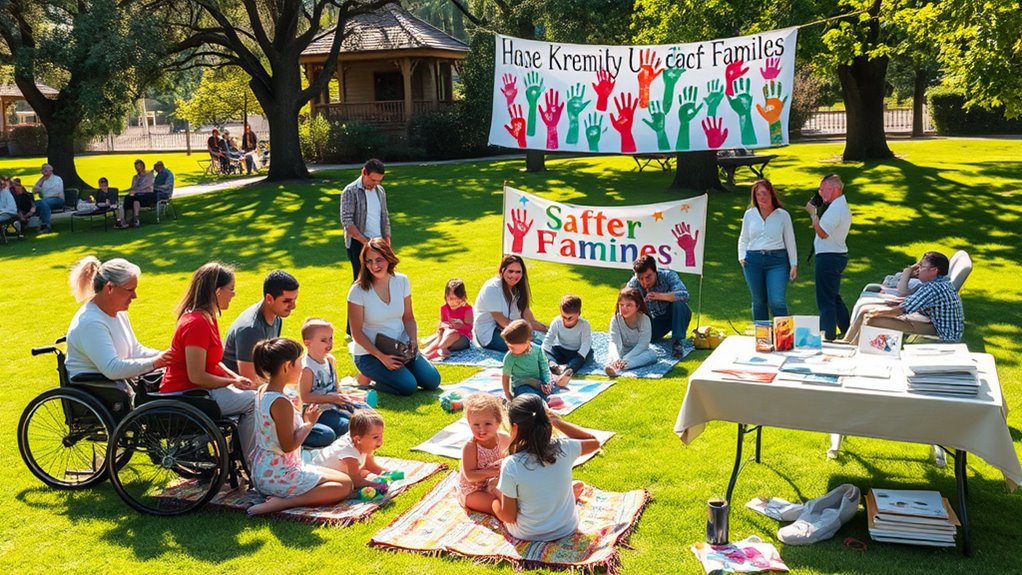Building a Support Network for Special Needs Families
When you think about building a support network for families with special needs, it’s essential to reflect on the unique challenges and strengths your family faces. Engaging with local resources and connecting with others who share similar experiences can make a significant difference. By fostering relationships with professionals and participating in support groups, you not only gain insights but also create an environment where everyone feels understood. Yet, many families often overlook key aspects that can enhance these connections. What might those be, and how can they transform your experience?
Understanding Your Family’s Needs
Every family has unique needs, especially when steering through the challenges that come with raising a child with special needs. You might feel like you’re juggling a lot, and that’s totally okay! It’s important to take a moment to understand what your family specifically needs.
Think about your child’s strengths and challenges. Is it more support with schoolwork, or do they need help with social skills?
Next, consider your family’s dynamics. How do you communicate? Do you have siblings that need attention too? Balancing everyone’s needs can feel like a high-wire act, but it’s doable!
Don’t forget about your own needs as a parent. You deserve time to recharge, laugh, and connect with others. After all, a happy parent often leads to a happy child.
Once you’ve identified these needs, it’s easier to build a support network that works for you. Remember, you’re not alone in this journey! Many families are in the same boat, so reaching out to others can provide invaluable insights and encouragement.
Identifying Local Resources
Once you’ve pinpointed your family’s needs, the next step is to identify local resources that can provide the support you require.
Start by checking your community’s websites. You’ll often find helpful lists of services available nearby. Don’t forget to ask your friends or neighbors; they might know a great resource you haven’t discovered yet.
Local libraries can be treasure troves of information, too! They often have bulletin boards filled with flyers about support groups, workshops, and activities for special needs families.
You could also reach out to schools. They usually have resources or can guide you to local organizations that specialize in helping families like yours.
Don’t shy away from social media groups either! Many communities have pages dedicated to special needs families where you can ask questions and get recommendations.
Remember, it’s perfectly okay to seek help; everyone needs a hand sometimes, and you don’t have to do this alone.
By identifying these local resources, you’re laying the groundwork for a solid support network.
Connecting With Support Groups
Finding a supportive community can make a world of difference for special needs families. When you connect with support groups, you’re not just finding people; you’re finding friends who truly understand your journey.
These groups often meet regularly, giving you a chance to share experiences, swap advice, and even laugh about the craziness of life.
You can start by checking online platforms, local community centers, or even social media. Who knew scrolling could lead to such meaningful connections? Many groups focus on specific challenges, like autism or ADHD, so you can find one that fits your family’s needs.
Once you join, be open to sharing your story. You’ll find that others have faced similar challenges, and their insights can be invaluable.
Plus, these friendships can help you feel less alone. Don’t hesitate to ask questions or seek advice; it’s what these groups are for!
Building Relationships With Professionals
Connecting with support groups is just the beginning of building a strong network for your family. Next, you’ll want to focus on building relationships with professionals who can help you navigate the world of special needs. These folks can be teachers, therapists, doctors, or counselors. They’re like your team of superheroes, ready to support your family in amazing ways!
Start by introducing yourself and sharing your family’s story. Don’t be shy! Most professionals appreciate when you open up. Ask questions, and don’t hesitate to express your concerns. They’re there to help, and your input matters.
Remember, it’s a two-way street. Building trust is key, so show appreciation for their hard work. A simple “thank you” can go a long way.
When you attend meetings, workshops, or appointments, be proactive. Take notes and follow up on any advice they give. Building relationships takes time, but it’s worth every minute.
You’ll feel more empowered, and your professional network will grow. Plus, who knows? You might even make some new friends along the way. And let’s be honest, everyone could use a few more friends!
Leveraging Online Communities
Many families are discovering the power of online communities to enhance their support networks.
These virtual spaces are like a big, cozy blanket where you can share your feelings, ask questions, and find others who really get what you’re going through. You might feel alone sometimes, but trust me, you’re not!
Joining forums, social media groups, or even blogs focused on special needs can connect you to parents who face similar challenges.
You can exchange tips on everything from therapy options to the best toys that keep your kids engaged. Plus, you can learn about local resources and services that might be just around the corner!
Don’t forget, online communities are also a great way to celebrate your victories, no matter how small. Did your child try a new food? Share it!
When you post about these wins, you’ll inspire others, and maybe even score some virtual high-fives.
Organizing Family-Friendly Events
As you build your support network through online communities, consider taking that connection offline by organizing family-friendly events. These gatherings are a great way to meet other families who understand your journey. You can plan simple outings like picnics or game days at a local park. Everyone can bring their favorite snack to share, and the kids can make new friends while you chat with fellow parents.
If you’re feeling ambitious, think about hosting a themed event! A costume party or a talent show can spark creativity and laughter. You could even involve your kids in the planning—let them pick games or activities. This not only makes them feel included but also helps them develop social skills.
Don’t forget to pick a venue that’s accessible and has facilities for everyone. You want all families to feel welcome and comfortable. Plus, maybe you’ll discover hidden talents in your group—who knew someone could juggle while balancing on one foot?
In the end, these events can transform your online friendships into real-life connections. You’ll create lasting memories and build a community that supports each other in fun, engaging ways.
Encouraging Open Communication
Open communication is essential for special needs families, and fostering it can strengthen your support network. When you openly share your thoughts and feelings, you create trust and understanding among your family and friends.
It’s like planting seeds in a garden; the more you share, the more your relationships can grow!
Start by being honest about your experiences. Share your joys and challenges with others. You might be surprised at how many people can relate to your situation.
Don’t be afraid to ask for help, either. Everyone needs a little support sometimes, and your friends may be enthusiastic to lend a hand.
Listening is just as important as talking. When someone shares their story, give them your full attention.
Ask questions, show empathy, and offer encouragement. This two-way street helps everyone feel valued and connected.
Sustaining Long-Term Connections
Building on the foundation of open communication, sustaining long-term connections with your support network is essential for special needs families. You know how important it’s to have people who understand your journey. By keeping in touch regularly, whether through phone calls, texts, or meet-ups, you strengthen those bonds.
It’s like watering a plant; the more you nurture it, the better it grows!
Remember to celebrate the little victories together. Sharing successes, even the small ones, can bring everyone closer. Plus, don’t shy away from asking for help when you need it. Your friends and family want to be there for you, so let them!
It’s also important to give back. Offer your support to others in the network. This creates a lovely cycle of help and friendship.
And hey, don’t forget to have some fun! Organize a casual get-together or a game night. Laughter can lighten heavy hearts and keep connections strong.
In the end, it’s all about creating a community where everyone feels valued and understood. Keep those connections alive, and you’ll find strength and joy in your journey together!




